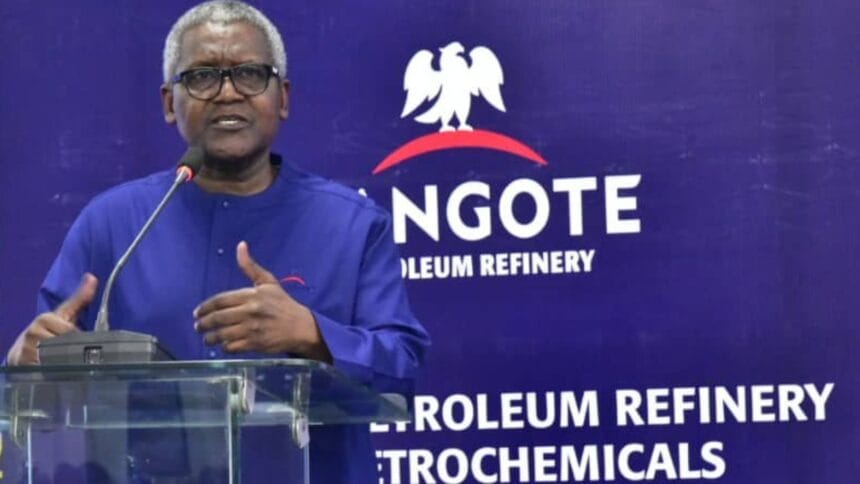… says 47% foreign crude contracts expire by year-end
… relies on NUPRC, NNPC’s 2.5m bpd target, reactivation of shut-in wells in Niger Delta
… slashes gantry price of petrol to ₦820/litre, second cut in July
Oredola Adeola
The Dangote Oil Refinery, now processing 550,000 barrels per day at its 650,000 bpd-capacity Lekki Free Zone facility, plans to fully switch to 100 percent local crude by December 2025, ending its 47 percent dependence on U.S. supply through increased sourcing from Nigerian producers.
Devakumar Edwin, Vice President of Dangote Industries and head of the refinery, disclosed the plan in a statement cited in a recent Bloomberg report.
The development partly attributed to improved coordination with the Nigerian National Petroleum Company Limited (NNPCL) under its new leadership and Board, led by Group Chief Executive Officer Engr. Bayo Ojulari, alongside local oil traders, enabling a steady and growing supply of Nigerian crude.
Devakumar Edwin, Vice President of Dangote Industries and head of the refinery, has disclosed that existing contracts with foreign crude suppliers, 47 percent of which came from the United States, are nearing expiration and will not be renewed.
He confirmed that the refinery sourced about 53 percent of its crude from local producers in June and expressed confidence that the facility will transition to 100 percent Nigerian crude by the end of 2025.
“We expect some of the long-term contracts will expire. Personally, and as a company, we expect that before the end of the year, we can transition 100 percent to local crude,” Edwin said.
He noted that since the refinery began operations, it has purchased crude from countries such as Brazil, Angola, Ghana, and Equatorial Guinea.
According to him, improved relations between the refinery, local oil traders, and the government are already contributing to a more stable supply of Nigerian crude.
Dangote Refinery and other local refiners have faced challenges in securing local crude supply contracts in Nigeria due to persistent crude theft and frequent pipeline attacks in the Niger Delta region.
This comes as the company also announced a further reduction in the gantry price of petrol from ₦840 to ₦820 per litre, effective July 8, 2025.
This marks the second price cut in July, following an earlier reduction from ₦880 per litre as of June 30, 2025.
However, recent progress under the current administration has led to an increase in the number of active oil rigs, which has risen to 46 as of July 2025.
This improvement, according to Engr. Gbenga Komolafe, Commission Chief Executive (CCE) Nigerian Upstream Petroleum Regulatory Commission (NUPRC), is credited to the Federal Government’s kinetic and non-kinetic interventions aimed at curbing oil theft.
He also confirmed that the Commission is also driving efforts to boost production, with output reaching 1.7 million barrels per day.
This has been achieved through the reactivation of dormant oil fields, faster regulatory approvals, and improvements in upstream operational efficiency.
These developments align with the NUPRC’s Project One Million Barrels initiative, launched in 2024, which targets increasing production from 1.46 million to 2.5 million barrels per day by 2026.
Engr. Ojulari, GCEO has reaffirmed the company’s commitment to increasing crude oil production in line with President Bola Tinubu’s directive to raise sustainable output to 2 million barrels per day by 2027 and 3 million barrels per day by 2030.
Speaking during his keynote address at the 24th edition of the NOG Energy Week in Abuja, Ojulari stated that, as of June 2025, NNPCL is pursuing this target through the restoration of 100 percent crude oil pipeline including the Trans-Niger Pipeline (TNP), Trans Escravos Pipeline (TEP), Trans Ramos Pipeline (TRP), Trans Forcados Pipeline (TFP), and the Oando-Brass line.
According to him, the improved integrity and availability of these pipelines will facilitate the reactivation of several shut-in wells across the Niger Delta, as producers can now transport crude more reliably to export terminals.
Ojulari has on the back of this called for increased investment in the oil and gas sector to accelerate national crude output and achieve production targets.




